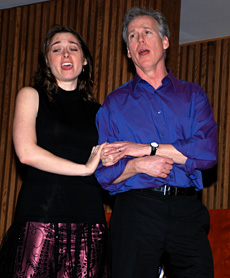 RSS
RSS
Dr. Denis Lafreniere and Flo Lacey on WNPR
Experts with the Voice and Speech Clinic Offer the Following Advice for Preserving Your Voice
- Keep your voice fit: It’s important to exercise the vocal muscles particularly as one gets older. Be sure to exercise the voice for about 30 minutes several times a week. Singing with the radio, calling a friend on the phone, reading aloud from the newspaper or joining a local choir are all great ways to get a vocal workout.
- Drink plenty of fluids: Vocal tissues are easily dehydrated. To prevent dehydration, drink plenty of liquids, especially water. Maintaining proper humidity in the home is also helpful.
- Avoid airborne irritants: Smoke is irritating to the throat and vocal tissues. It can cause hoarseness and other changes in the quality of the voice and can lead to tissue changes, including cancerous growths on the vocal cords that require medical or surgical treatment.
- Avoid vocal abuse and misuse: Yelling, screaming, speaking at too low a pitch, and speaking or singing too loudly or for too long can result in problems affecting the vocal cords.
- Treat reflux: Esophageal reflux is the regurgitation of stomach juices into the esophagus and throat. Smoking, alcohol use and caffeine intake contribute to reflux. It irritates the larynx and can lead to coughing, burning, excess mucous, and throat clearing. Over time, it can cause ulcers on the vocal cords.
- Take vocal naps: Rest your voice for 15-minute intervals several times during the day.
Feature Story
Health Center Today, May 7, 2010
Voice Through the Ages: Celebrating World Voice Day
By Chris Kaminski

Professional singers entertained participants during the 2009 World Voice Day event at the Health Center.
Photo by Janine Gelineau
World Voice Day is observed to appreciate voices and to raise awareness about vocal health care. At the UConn Health Center, the day will be celebrated on Saturday, May 15, with a program that explores age-related issues throughout the life span of the voice. The educational program is open to the community as well as musicians, singers, and students who are pursuing health careers such as speech pathology.
The free program will run from 8:30 a.m. to noon in Keller Auditorium, and will include educational presentations about vocal health and care for various age groups, and exercise and advice to increase vocal longevity.
This year, the program will also include guest performances by Broadway veterans, Flo Lacey, “Evita,” and Charles Pistone, “Les Miserables,” followed by a discussion of vocal aging and the professional singer.
The event is being presented by the Health Center’s Voice and Speech Clinic. “Part of our job is to raise awareness about voice disorders and let people know that help is available,” explains Dr. Denis Lafreniere, director of the Voice and Speech Clinic.
He notes that UConn offers comprehensive care to diagnose and treat voice disorders among musicians and performers, including professionals with the Hartford Stage Company, Connecticut Opera, and Hartt School of Music, as well as people from many other professions who rely on their voices.
“Teachers, broadcasters, sales representatives, ministers, lawyers, receptionists, parents – the list is lengthy,” says Lafreniere, an otolaryngologist (ear, nose and throat expert) and specialist in head and neck surgery.
Along with Lafreniere, patients are seen by one of three voice-trained speech pathologists: Starr Cookman, Patricia Doyle or Janet Rovalino. The speech pathologists analyze the functional realm of each patient’s voice and Lafreniere focuses on contributing medical factors. Diagnoses and treatment plans are made after patients are evaluated by speech analysis computer software and/or videostroboscopy. Treatment plans may consist of speech therapy, surgery, or a combination of these approaches.
“The results can be dramatic. We’ve videotaped patients before and after surgery or treatment, and the improvements are astonishing,” Lafreniere says. “Our goal is to get people back to what they were doing. Most of us take our voice for granted – until we lose it,” he adds.
To register for the event or for more information about the Voice and Speech Clinic, call 800-535-6232.

